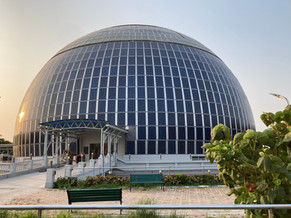People, Amazing People
- Angie Gallion Lovell
- Jun 8, 2024
- 5 min read

A full month has passed since my trip to India and I am finally able to start putting it into words. Three words to be precise: It was incredible. I flew out of Atlanta on Friday evening on Qatar Airways. From there, time-warped, and nine hours evaporated in flight. I landed in Doha, Qatar, and was bussed to the terminal to catch my next flight to Kolkata. I arrived at 2:30 in the morning, made it through customs, collected my bag, and stepped out into the wild night where several rows of people were waiting. A young man held a sign with my name and I was on my way to the hotel.
The ride to the hotel was the only moment I wondered what I had gotten myself into. I couldn’t get a scope for the size of the city but it was much larger than I expected. My driver whipped through traffic and horns were honked from nearly every vehicle we approached or passed. I would come to learn that this is the way it is done in Kolkata. Advisements to “Use Your Horn” are painted on the back of many of the vehicles and it seemed that there were some honks that meant “coming up on your left,” some that meant “coming up on your right,” and some that seemed to say, “thank you.” I didn’t hear many that seemed to mean what a honk in America means.

We stayed at the Rajarhat Westin Inn. I was on the 26th floor. From my window, I could see the second tower (or maybe it was a different hotel, and the empty spaces leading toward the city. In Kolkata, the hotels are on the perimeter. Kolkata is the capital of West Bengal, a state in India. The first day I was there, I found that the chefs had completed a themed dessert challenge. It is a thing they do routinely. But this challenge was particularly interesting to me because it was all book-themed. that seemed somehow specially ordained for me considering that while I was in India I approved the layout for my next book, Those We Do Not See, which will launch on 6/11/2024.
The metro area of the city boasts a population of over 14MM people and on the night of my first arrival, it seemed that everybody was on the streets. The city was the capital of the country when it was under British rule and the influence of the West on the city was evident. The British lost the ruling power in 1911 and now India is under Indian control. While I was there, elections were underway and it was fascinating to watch the news coverage and to hear Gaurav try to explain the intricacies of their democracy. They are a competitive, multi-party state. I never did quite get a grasp of who was running or what their platforms were, but one evening I returned to the hotel as a VIP arrived, was greeted and escorted to his room. They greeted him with a candle and flowers and his entourage of gun-wielding security swept the hotel lobby and cordoned the few guests present out of the way. It was wild. The next morning at breakfast I tried to figure out which political leaders I had seen but couldn’t put it together.

Every morning my driver met me out front and drove me to the office. We drove past a field where cows ambled next to a field where people gathered for what appeared to be impromptu soccer matches. We drove past Basti villages built out of corrugated metal and tarps. The pulse of the city was incredible to witness. Every evening, he was waiting to take me back again. The travel to the office was orchestrated chaos and more than once, my driver would catch my eye in the mirror and say, “No rules,” and it seemed to be true. I could never make sense of the navigation of the traffic and was impressed with my driver’s ability to weave between cars, past rickshaws, motorcycles, bicycles, and pedestrians with scant inches to spare. Nobody seemed remotely concerned when he honked his way past them, around them, or through them. It seemed understood and all that honking lacked hostility. One evening, a cyclist pulled alongside us as we waited to turn right onto a side street, my driver honked, waved the man back, and he obligingly moved back. It was the most unexpected thing to see another motorist give way like that.
The food was incredible. Most evenings I ate in the buffet-style dining hall. Most days, almost all days, I had dessert. It was impossible not to want to try everything. Every lunch, we shared meals in the break room, where I tried and enjoyed everything they offered. The dishes ranged from biriyani to paneer to dal, coupled with the best naan I’d ever had. The food was one of the highlights for me. I liked Indian food before this trip, as far as I’d experienced it, but I love Indian food after having the leisure of actually trying a plethora of dishes. They have a wide variety of vegetarian options that are proud to be vegetarian and not trying to be something else. No faux meat on my table, thank you very much. The buffet at the hotel was a taste of adventure at every meal. It’s funny to think that I packed a bag of meal replacement powder in case the food didn’t agree with me. It agreed with me. I have never felt so not hungry as I did while in India. The food's fiber content and nutritional value was so dense that my body was happy.
Of all the things that I came away respecting and loving about India, it was the people that will live in my heart. Perhaps, because that was what had most concerned me. I didn’t know what to expect culturally. We had twenty-five analysts on board, a manager, two QC analysts from the Noida office, my manager, two QC analysts from America, and me. I never did manage to get everybody’s name solidly in my mind, but I knew them all by the second day. I knew the smiles, the sound of each voice, the questioning bob of the head when something was beginning to make sense but wasn’t all the way there. I saw intelligence, curiosity, and a willingness to learn that was exciting for me. I was impressed that the team wasn’t just asking for me to tell them how to write something, they had a deep desire to understand why it needed to be written in such a way. It was refreshing. It seems that people often want to give the least effort for the biggest reward, maybe that’s an American trait. There was none of that here. They were there every day, focused and trying, writing narratives in a second language with skill and understanding. They struggled with all of the same things that American analysts struggle with, but not much more. When I came away from India, I came away with a great deal of respect for the people I met.
I managed to visit a mall, Eco Park, the Queen Victoria Palace, St Paul’s Cathedral, and several temples. All of that was very cool, but it is the people that take up most of my memory.




















































































































































































Comments